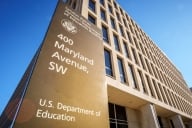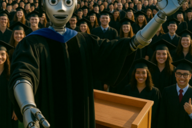You have /5 articles left.
Sign up for a free account or log in.
Too seldom do we ask graduate students in science or engineering about their experiences in completing doctoral degree requirements. We go to administrators, faculty, and sponsors, but we don't ask students -- the main educational client -- what they make of what is happening to them. In particular, we are remiss with minority graduate students.
The need to communicate is self-evident. In 2004, fewer than 500 African American citizens and permanent residents earned Ph.D.'s in science and engineering fields, not even 1 percent of the total awarded. The numbers in some disciplines are so tiny as to defy sensibility: 17 in computer and information science, 13 in physics, 10 in mathematics, zero in astronomy. Today the science and engineering workforce -- like medicine, law, and business -- barely resembles the rest of America. The pattern for African Americans, observed for over half a century, is particularly bleak.
Last summer, I asked 40 minority doctoral candidates about their experiences in a "talk back" session at the annual meeting of the Graduate Scholars Program of the David and Lucile Packard Foundation. Since 1992, Packard Scholars have been selected from among the premier graduates of historically black colleges and universities.
The discussion confirmed that -- for these scholars at least -- those who do enter graduate programs in the sciences often face pressures not experienced by their non-minority colleagues. "It's not fun being a trailblazer in 2005," said one scholar, "because there are certain things we should not have to deal with. When you already have the responsibility and expectation of class work, nobody wants to carry the burden of the entire race and deal with issues that should have been resolved a long time ago."
Often, minority doctoral students in the sciences become PR spokespeople: "We are called upon to do a lot on diversity for the university. To sit on panels every time a black student is invited to the school ... to attend conferences, to take pictures for publications that show the diversity of the university. While we are doing these things, our counterparts are in the lab doing research and producing publications.... When a first-year student comes in, I want them to see another black face. But how do I maintain that research direction and focus? I have an extra burden not carried by my majority colleagues."
And while many students are supportive of diversity efforts, they cannot help but feel conflicted about the competitive realities facing science grads. "Yeah, I wanted to be a trailblazer," summarized one student, "but I also want the Nobel Prize in physics. I don't want to trail blaze in race relations at the university. I want to focus on my research and come up with a new laser treatment for cancer, that's my focus. I don't want to have to deal with the other stuff. Let me be me, let me shine, get your foot off of my neck, let me do my work."
The experiences voiced by the Packard Scholars are not unique. The AAAS Center for Advancing Science & Engineering Capacity was created to assist universities and colleges committed to improving the success of all students and faculty, especially those of color. The Packard Scholars reinforced much of what we've learned from our site visits, focus groups, and data reviews (for the center's approach, see this article). Their insights are noted here, many in the scholars' own voices.
Outreach must penetrate the academic reward system. As a faculty activity, outreach ranks a distant third behind research/entrepreneurship and teaching. Neither the faculty effort nor the outcome will change without institutional policies that restructure rewards. As one scholar put it, "Diversity will not be an issue until you start diving into their pockets, their budgets, because they'll do anything to get and keep their grants. But, if a university ... has all the money they need and new buildings, but they have never graduated an African American person, it's too easy to say, 'Oh, we don't know what to do, or we don't have the resources.' That's bull, because if you want the resources, you can get them."
And another remarked, "The program I selected had four African American graduates in the last 10 years. Two more are there now and another came in with me.... That makes a huge difference. Establish a great relationship with one student; make one happy and others will hear.... That is the easiest way to recruit because if they went to a black school, there are other students in their department who are looking for a good graduate program."
Gender and racial bias is a reality. Get over it -- with or without mentoring. The Packard Scholars report discrimination is alive and well in university programs: It ranges from negative comments in the lab about ability or preparation to the faculty's assumption that the only two black students in the department are going to work together. Some universities have developed mentoring or other support programs to mitigate the effects, while others let the problems go unattended.
Many students recommended that universities conduct diversity sensitivity training for the faculty. "That stops a lot of the comments and issues in the labs and in the classroom."
Still others found mentoring programs to be effective interventions. "I'm in medical school now [as an M.D./Ph.D. student], and there are institutionalized mechanisms designed with the philosophy that if we bring you to the school, it looks bad if we can't bring you to completion. Some of these or similar mechanisms, like 'big sib, little sib' mentoring situations can be implemented early. If you start to intervene after the first warning signs, these are still very much preventable problems. I think we would see a much improved attrition rate if we didn't wait until the problem is full blown -- a classic ounce of prevention is worth a pound of cure."
In situations lacking a formal infrastructure for dealing with discrimination, students devise their own. "Coming from [a historically black college/university] where the learning environment was more constructive, I was overlooked here several times because I was the only black in the class. I came up with strategies to cope. My best friend and I would intentionally split up ... so that we weren't in the same group.... We were able to survive because he would bring the information back to me and vice versa."
The student must focus on completing doctoral requirements. This form of accountability is a "performance contract" between student and major professor (if not one's dissertation committee). It reveals to the student the delicate balance of his/her endeavor: "When I started graduate school, the faculty taught us to work together, yet how to be competitive.... If I asked my advisor how to do something, he would guide me, but say 'You are different people, and I'm going to approach you at your level, so I may not ask you to do something that I ask your cohort to do because you are at a different place. But the results should be the same, because you are all here to get the Ph.D."
All kinds of institutions can be "minority serving." If we examine the baccalaureate origins of African American Ph.D.'s and of Latino Ph.D.'s, historically black colleges and Hispanic-serving Institutions, respectively, are the largest producers. But Massachusetts Institute of Technology, Stanford University, and the University of California at Berkeley, among others, have distinguished records as producers of minority bachelor's graduates who go on to earn a doctorate in science or engineering. In addition, relative newcomers such as University of Maryland-Baltimore County and Louisiana State University are undergraduate models of student preparation for science-based Ph.D.'s. Some institutions, and often departments within institutions, clearly "get it." But decentralized authority at the graduate level ensures unevenness and lack of sharing of best practices.
New Ph.D.'s underestimate the skills they possess. The orientation of most graduate programs in the sciences is to a single sector or career pathway that represents immediate job opportunity, but little demand for versatility. Because the doctoral training process reproduces the past, (i.e., the traditions that fit an earlier time), it also reflects the biases and career of one's major professors. Consequently, the Ph.D. experience minimizes belief and understanding about skills beyond science fundamentals. The Capacity Center works with institutions to develop the skills required by 21st century organizations, academic and nonacademic alike: teamwork, problem-solving, adaptation, communication, cultural competence.
This is about leadership -- the overarching need to grow leaders. For all the talk about the impact of mentors and role models, there will always be successful professional women and persons of color who will say, "It was tough for me and it's going to be tough for those who come behind me." These folks, irrespective of vintage or field, will not reach out. That's just the way they are -- making assumptions, suppressing memories of the help they received, and dealing with students their way. As one scholar noted, "Just think about how far the world has come in 10 years. Most of these cats [faculty] we're working for got their Ph.D. in the 1980s, 70s. The technology is moving way too fast and with the stuff that we know, we'll take their jobs. Some of them do everything they can to keep you from completing these programs, making it that much more difficult. The last thing they want to do is lose a job to you."
Change comes as new professionals ascend to positions that control resources and decisions. It may mean climbing the academic ladder or pursuing a nonacademic path. Both routes demonstrate that it's who you know plus what you know that matters -- not one or the other exclusively. Who's in your network? Who talks to whom? The AAAS Capacity Center makes explicit these aspects of professional socialization and networking that can make a difference in a career.
The nation has invested in science and engineering since Sputnik -- a half century -- to advance its education, economic, workforce, and national security interests. When students are not recruited and nurtured to degree completion, we waste talent and material resources -- in defiance of student demographics and to the detriment of the nation's place in the world.




